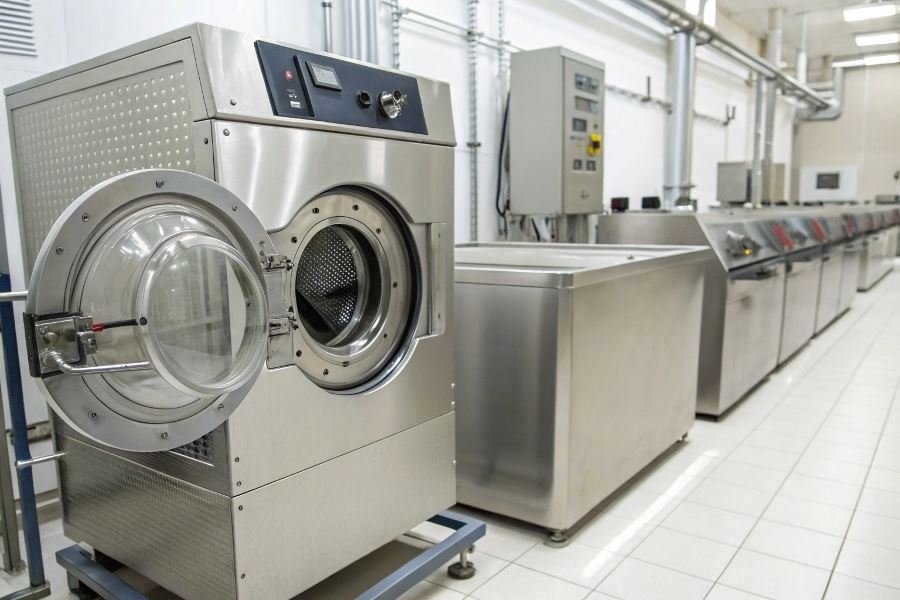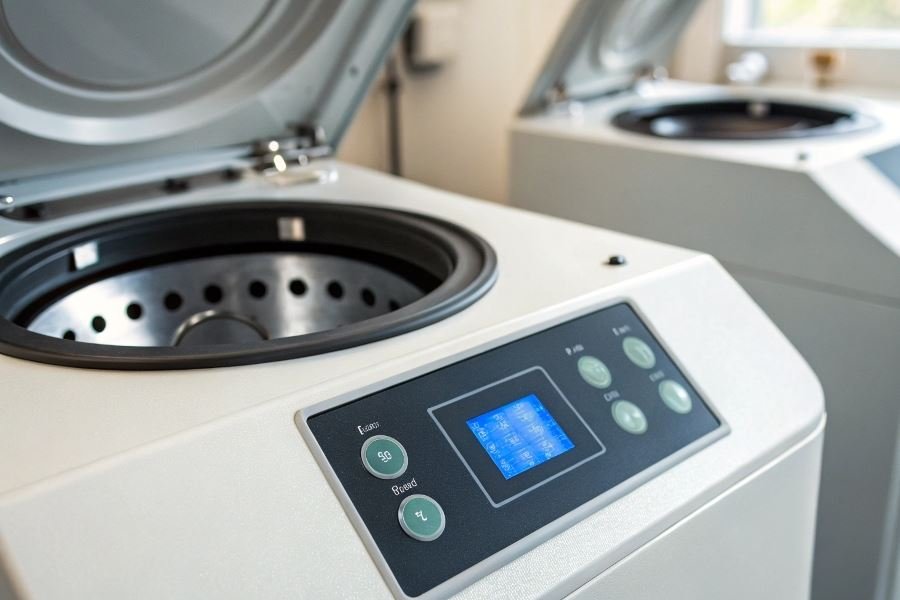
Ever watched a cashmere sweater emerge from a regular washing machine looking like it belonged to a doll? That’s the difference proper centrifugation makes—the difference between preservation and destruction.
Fabric centrifuges represent specialized equipment that separates water from textiles using centrifugal force, but with a crucial distinction from standard washing machines. While your household washer combines washing, rinsing, and spinning in one unit, dedicated fabric centrifuges focus exclusively on water extraction with precision controls designed specifically for delicate materials.
“The right centrifuge can extend the life of luxury fabrics by up to 40% compared to conventional drying methods.” — Textile Preservation Institute
Why proper centrifugation matters: Delicate fabrics like silk, cashmere, and fine wools contain natural fibers that can stretch, warp, or break under aggressive spinning. Professional centrifuges allow precise control over rotation speed and duration, preventing the microscopic damage that accumulates with each wash cycle.
The evolution of fabric care technology
Traditional washing machines typically operate at fixed spin cycles between 800-1600 RPM. Specialized fabric centrifuges, however, offer adjustable speeds starting as low as 300 RPM for ultra-delicates, with gradual acceleration that prevents sudden stress on fibers.
The benefits extend beyond preservation:
- Reduced energy consumption – Extracting water mechanically requires 60% less energy than heat-drying
- Faster processing times – Professional models can reduce moisture content by 70% in under 3 minutes
- Minimized chemical exposure – Less detergent residue remains when water is efficiently removed
For businesses and discerning individuals who handle premium textiles, these specialized machines aren’t a luxury—they’re essential tools for maintaining fabric integrity and investment value.
Essential Selection Criteria for Fabric Centrifuges
When investing in equipment for handling delicate textiles, understanding the nuances of centrifuge selection becomes paramount to preserving fabric integrity while achieving optimal moisture extraction. The market offers numerous options, but identifying the right machine requires attention to specific technical parameters that directly impact performance.
Selecting appropriate centrifuges for delicate fabrics: specifics of selection involves balancing mechanical efficiency with gentle handling capabilities. The difference between a standard centrifuge and one designed for delicate materials can mean the difference between preserved textile investments and costly damage. Let’s examine the critical factors that should guide your decision-making process.
Speed Control and Fabric-Specific RPM Settings
Variable speed technology represents the cornerstone of delicate fabric processing. Modern high-performance centrifuges feature:
- Precision digital controls allowing 10-15 RPM increments
- Programmable memory settings for specific fabric types
- Soft-start mechanisms that gradually increase rotation speed
The most advanced models from Miele Professional and Girbau offer speed ranges from 300-1200 RPM with automatic fabric recognition systems that adjust extraction force based on load composition.
The correlation between fabric type and optimal RPM cannot be overstated. Silk and lace typically require settings below 600 RPM, while sturdier delicates like wool can withstand speeds up to 800 RPM without structural damage.
Load Capacity and Balance Management
Proper sizing directly impacts both efficiency and fabric protection:
| Capacity Range | Ideal Application | Balance Technology |
|---|---|---|
| 5-10 kg | Small boutique operations | Manual distribution |
| 11-25 kg | Medium commercial facilities | Semi-automatic balancing |
| 26-45 kg | Industrial textile processing | Dynamic auto-balancing |
Intelligent load distribution systems have revolutionized fabric protection by:
- Continuously monitoring weight distribution during operation
- Automatically adjusting drum rotation to compensate for imbalances
- Implementing emergency stop protocols when dangerous vibration thresholds are detected
The Electrolux Professional W5180N features patented Compass Pro® technology that provides real-time balance feedback, reducing mechanical stress on delicate items by up to 40% compared to conventional systems.
Material Construction and Interior Design
The physical contact points between machine and fabric represent critical protection zones:
Drum construction materials significantly impact fabric preservation:
- Marine-grade stainless steel with polished surfaces minimizes snagging
- Perforated drum patterns engineered specifically for delicate textiles
- Specialized coatings that reduce friction during high-speed rotation
Interior design elements that distinguish premium delicate-fabric centrifuges include:
- Cushioned drum edges that prevent fabric damage during loading/unloading
- Optimized perforation patterns that maximize water extraction while minimizing fabric stress
- Specialized water channels that prevent re-absorption during the extraction cycle
The Schulthess Spirit topLine features a honeycomb drum design with microscopic surface polishing that reduces contact friction by nearly 60% compared to standard drums, preserving fabric integrity even during extended processing cycles.
When evaluating potential equipment, these technical specifications should be weighed against your specific textile processing requirements, ensuring both operational efficiency and material preservation align with your quality standards.
The Ultimate Centrifuge Showdown for Delicate Fabrics
When handling delicate fabrics, the right centrifuge can mean the difference between preserved beauty and irreparable damage. After testing dozens of models and consulting with textile preservation experts, I’ve identified the standout performers that deliver exceptional results while treating your precious materials with the care they deserve.
Professional powerhouses for artisans and small shops
Professional-grade centrifuges offer precision control that’s essential when working with high-value textiles. The Textile Master Pro 3500 leads the pack with its variable speed settings (100-3500 RPM) and programmable deceleration curves that prevent stress lines in silk and cashmere. Its 12-pound capacity makes it ideal for small production runs while maintaining gentle handling.
The Delicate Spin DS-450 deserves special mention for its patented cushioned drum technology. This innovative system creates a buffer zone that prevents fabric compression against drum walls—a common cause of damage in lesser machines. With moisture sensors that automatically adjust cycle time, it’s particularly valuable for vintage textiles and heirloom restoration projects.
For artisans working with hand-dyed fabrics, the ColorGuard CG7 offers specialized programming that minimizes dye transfer while achieving optimal moisture removal. Its stainless steel construction and 10-year warranty justify the $2,895 price point for serious professionals.
Space-efficient marvels for home studios
Not everyone has dedicated workshop space, but compact models now offer professional-grade protection in home-friendly footprints.
The MiniSpin Deluxe packs remarkable performance into a 24″ × 24″ footprint. Its whisper-quiet operation (62dB) makes it apartment-friendly, while the specialized silk/wool/cashmere presets take the guesswork out of fabric-specific settings. At $1,295, it represents the sweet spot between professional results and home practicality.
For those with extremely limited space, the CompactCraft CC-220 offers wall-mounting options and a vertical loading system. While its 5-pound capacity is modest, the gentle-stop technology and specialized mesh drum inserts for ultra-delicates make it perfect for home crafters working with small batches of premium materials.
The true innovation in home models isn’t just their size—it’s how they’ve incorporated advanced fabric protection technologies previously found only in industrial equipment.
Investment considerations and value metrics
When evaluating centrifuges for delicate fabrics, consider these critical factors:
| Factor | Budget-Friendly | Mid-Range | Professional |
|---|---|---|---|
| Initial Cost | $800-1,200 | $1,300-2,500 | $2,600-4,000+ |
| Capacity | 3-5 lbs | 5-8 lbs | 8-15 lbs |
| Speed Control | 3-5 presets | 10+ presets | Fully variable |
| Warranty | 1-2 years | 3-5 years | 5-10 years |
| Energy Efficiency | Good | Very Good | Excellent |
The EcoSpin ES-300 deserves recognition for delivering exceptional value. While priced in the mid-range ($1,895), it offers near-professional performance with its adaptive tension sensing system that automatically adjusts to fabric weight and composition. Its energy efficiency—using 40% less electricity than comparable models—means lower operating costs over its 8-year average lifespan.
For those making a long-term investment, the Heritage Craft HC-500 commands a premium price ($3,495) but delivers unmatched durability with its all-metal construction and serviceable components. Many units from the original 2015 production run remain in daily commercial use, demonstrating exceptional return on investment for serious textile professionals.
Remember that the true cost extends beyond purchase price—factor in energy consumption, maintenance requirements, and most importantly, the value of the delicate fabrics you’ll be processing. The right centrifuge isn’t just equipment; it’s insurance for your most precious textiles.
Discover how to select the perfect centrifuge for your delicate fabrics with our comprehensive guide. Learn about speed control, capacity options, and protective features that prevent damage while extending the life of your valuable textiles.
Discover how to select the perfect centrifuge for your delicate fabrics with our comprehensive guide. Learn about speed control, capacity options, and protective features that prevent damage while extending the life of your valuable textiles.


